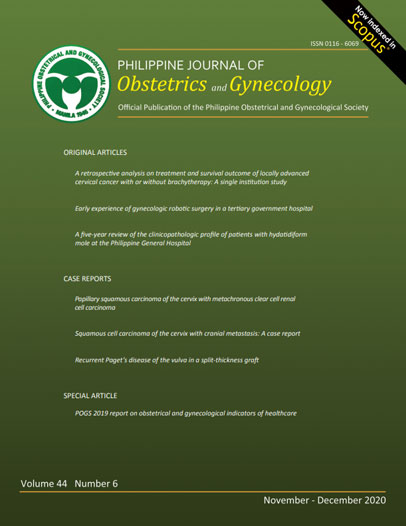Search for articles
Article Detail
A study of the knowledge, attitude and practices regarding menopause and its treatment among gynecologic oncology patients treated at the Philippine General Hospital
Helen R. Amorin, MD, FPOGS and Jericho Thaddeus P. Luna, MD, FPOGS, FSGOP
Section of Gynecologic Oncology, Department of Obstetrics and Gynecology, Philippine General Hospital, University of the Philippines-Manila
Objective: To determine the knowledge, attitudes, and practices regarding menopause of gynecologic oncology patients treated at the Philippine General Hospital (PGH).
Methods: This was a prospective study which employed a KAP survey on menopause using a structured questionnaire designed by the author. The questionnaire was patterned after the Menopause Health Questionnaire of the North American Menopause Society (NAMS) and the Menopause Rating Scale (MRS). Descriptive statistics were employed in the analysis of data using frequency and percentages.
Results: There was a total of 100 respondents of the KAP survey conducted at the PGH Cancer Institute Section of Gynecologic Oncology Outpatient Clinic. Majority of the respondents were aware of the more common symptoms of menopause such as irritability (61%) and hot flushes (49%) but had limited knowledge regarding the other symptoms. Majority are not aware of the different treatment modalities available to address menopausal symptoms. Only 13% of the respondents knew about hormonal replacement therapy as a treatment option for menopause. Only a small proportion of the respondents were familiar with the different forms of complementary and alternative medicine. Most of the respondents viewed menopause as a natural event in a woman’s life and needs no treatment.
Conclusion: Majority of the gynecologic oncology patients included in the survey do not know about the symptoms of menopause and the treatment options available to address these symptoms. An overwhelming majority of the women included in this survey consider menopause as a normal part of a woman’s life and view menopause in a positive light. Most of the respondents also do not feel that it is a condition that warrants treatment. Although they also experienced some of the symptoms of menopause, majority of the respondents did not avail of any treatment.
Current Issue
Search article

